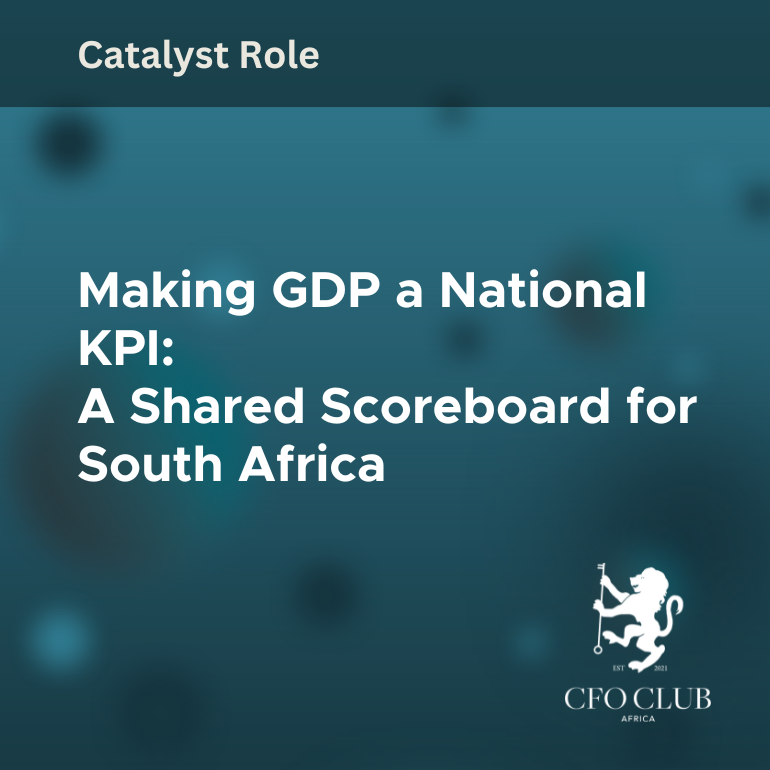Making GDP a National KPI: A Shared Scoreboard for South Africa
Imagine if South Africa’s politicians, CEOs, business leaders, trade unions and civil society all had to answer to the same performance measure. Not a political promise or a corporate profit target, but one that reflects the true health of the economy. That measure already exists: Gross Domestic Product, or GDP. The difference is that we treat it as a statistic instead of a shared goal. What if we changed that? What if GDP became a national Key Performance Indicator that every sector committed to improving together?
Why GDP Should Be Our Shared KPI
GDP is more than a number. It is the story of how a country earns, spends, invests and grows. When GDP rises, it signals expanding opportunity, growing demand and improved confidence. When it stalls, it reflects inefficiency, weak productivity and the erosion of wealth.
For South Africa, sustained economic growth is not a luxury. It is a necessity. It affects everything from job creation and fiscal stability to social cohesion. Yet growth has been too slow for too long. Making GDP a national KPI would shift accountability from being abstract to being actionable. It would mean that everyone, from the Minister of Finance to the factory floor, understands that their decisions in some way affect the national bottom line.
For CFOs, this is not an abstract idea. Business performance is closely tied to national performance. When the economy grows, companies expand, credit flows more freely and investment makes sense. When it stagnates, even the best-run organisation struggles to grow. Treating GDP as a national KPI creates alignment between boardrooms and government, and gives CFOs a stronger signal for planning and investment.
How It Could Be Done
The first step is clarity. GDP must be defined as a measurable, transparent and trackable indicator. For example, the country could target a specific annual real growth rate or focus on GDP per capita to reflect inclusive progress. The data already exists; what is missing is a shared commitment.
Next, that commitment must be national. Government, business, labour and civil society should each describe how they contribute to GDP growth. Government can remove structural bottlenecks, improve infrastructure and maintain policy certainty. Business can invest, export, innovate and employ. Labour can focus on productivity, skills development and partnership. Civil society can strengthen education, trust and accountability.
Every sector should report on its role in driving national growth. The goal is not to create competition between sectors but to build a common scoreboard. If GDP growth becomes a public performance measure, the national conversation changes from “Who is to blame?” to “How are we helping?”
The CFO’s Role in Implementation
CFOs can play a leading role in making this idea real. By integrating national growth metrics into corporate planning, forecasting and reporting, finance leaders can connect the big economic picture to practical business execution.
When preparing budgets and forecasts, CFOs can align growth assumptions with national targets and assess how their organisation contributes to GDP through investment, exports, employment and innovation. They can include a “national growth contribution” section in board reports to show how company performance links to the broader economy. This approach improves internal alignment and builds credibility with investors and stakeholders.
CFOs can also align corporate reporting cycles with the quarterly GDP releases from Statistics South Africa. In doing so, they reinforce the idea that company performance is part of national performance.
When and Why Now
There may never be a better moment to start. South Africa’s growth remains fragile, but that makes the concept more urgent, not less. Setting a national KPI does not require perfect conditions; it requires shared intention. By agreeing on a clear target, such as achieving and sustaining three percent real GDP growth within five years, the country can create a common direction for all sectors to rally behind.
In the short term, the initiative could begin with voluntary adoption. Businesses and government departments could publicly state how they plan to contribute to national growth. Over the medium term, this could evolve into a structured reporting and collaboration framework. Over the long term, GDP growth would become an institutionalised measure of success, much like internal KPIs drive corporate accountability.
The Risks and Realities
GDP is not a perfect measure. It does not capture inequality, environmental impact or quality of life. It is sometimes revised and published with delays. Even so, it remains the single most recognised indicator of economic performance. It provides a foundation upon which more detailed measures such as productivity, employment and sustainability can be built.
Making GDP a national KPI should not mean ignoring these other dimensions. Instead, it creates a unifying starting point. CFOs must ensure that the pursuit of growth remains responsible and inclusive. Growth that excludes or exploits will eventually fail. The goal is sustainable and shared progress that benefits both businesses and communities.
A Call to Shared Accountability
If South Africa adopted GDP as a national KPI, every decision, whether political, corporate or social, would be viewed through the lens of its contribution to national progress. This would create a new type of accountability that is transparent, measurable and collective. It would also require courage — the courage to accept that growth is everyone’s business.
For CFOs, this is an opportunity to lead beyond the balance sheet. By integrating national growth into corporate strategy, finance leaders can help build a culture of shared performance where success is measured not only by quarterly profits but by the country’s overall direction.
Growth is not automatic; it is built decision by decision. If GDP became South Africa’s national KPI, we could finally turn that principle into practice, transforming numbers into purpose and purpose into progress.





